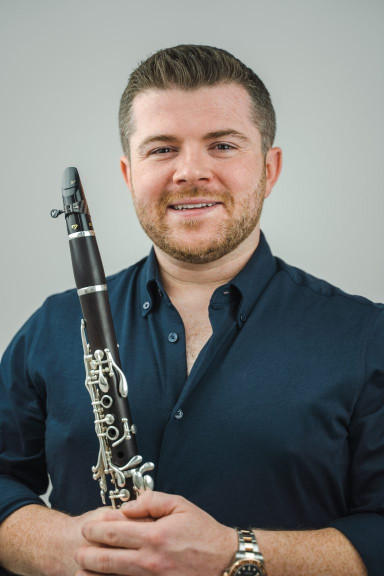Clarinetist Julian Bliss to Play with Illinois Wind Symphony

Clarinetist Julian Bliss. Credit: Vandoren USA
British clarinetist Julian Bliss is a leading soloist, chamber musician, recitalist, jazz artist, and masterclass leader. The last 18 months have seen him performing John Mackey’s clarinet concerto, Divine Mischief, with wind ensembles across the country. Bliss commissioned the piece from Mackey with a consortium of 25 ensembles, led by the Dallas Winds (Jerry Junkin, conductor) and the United States Air Force Band (Colonel Don Schofield, Commander and conductor). He premiered the piece with the Dallas Winds in October 2022 and has since recorded it with the Baylor University Wind Ensemble for Signum Classics.
The Illinois Wind Symphony, led by Director of Bands Kevin Geraldi, is Bliss’s next stop on his tour. The concert will take place on Wednesday, May 1, at 7:30 pm in the Foellinger Great Hall of the Krannert Center for the Performing Arts. Alongside Mackey’s Divine Mischief, the program will feature Nkeiru Okoye’s Voices Shouting Out and Zhou Tian’s Sinfonia.
In commissioning Divine Mischief, Bliss was inspired by the quality and extent of wind instrument training in the United States, which has led to many high-caliber wind ensembles and bands across the country. “I had played with some of them in the past, and there are already some great concertos and pieces written for clarinet and wind band,” he said. “But I thought it was about time that there was something new, and especially by one of the most eminent composers around.” So, Bliss emailed Mackey asking if he would compose a clarinet concerto for him.
John Mackey (b. 1973) has gained particular renown as a composer for wind ensemble. However, before Bliss contacted him, he had never attempted a clarinet concerto. According to the program note for Divine Mischief on the composer’s website, he was “terrified” by the genre. Nevertheless, Bliss was able to persuade him. “Maybe I’d had too much tequila when he asked, or maybe I was as scared as always, but smart enough to know that if somebody at Julian’s level of skill asks you to write for them, you do it,” Mackey writes in his note. “So I agreed, and the result is Divine Mischief. If you see Julian play, you immediately sense his charisma. This guy is a rock star on clarinet. And if you speak to him, you may sense that maybe he could cause some trouble—all in good fun, of course.”
Mackey asked his spouse, Abby (A. E. Jacques), to write a synopsis for the concerto as if it were a ballet to which he would compose a score. “Inspired by Julian’s personality,” Mackey continues, “Abby decided that Julian would play the role of a trickster figure, like Loki, Tom Sawyer, or Till Eulenspiegel.” To Bliss, having an in-depth scenario to go along with the piece is “a real luxury” and helps the audience relate to the piece. “And it helps my playing as well, I think, to understand what each part of the piece is about,” he added.
Bliss suggests reading the synopsis beforehand so you can immerse yourself in the piece during the performance. The story is reminiscent of Stravinsky’s ballet Petrushka. Set in a bustling town square, a peculiar figure begins to play his instrument for an intrigued crowd. The scenario has moments of levity that will spark laughter as well as moments of pathos as the main character toys with his audience. “The second movement in particular is an apology in some ways,” Bliss explained. “At one moment, the main character is a little bit remorseful and then suddenly isn’t, and he’s back to his old ways. To really channel those characters is quite fun.”
In addition to the dramatic demands, the concerto offers numerous musical rewards and challenges for both the soloist and the band. “It’s challenging for everybody,” Bliss said. “John Mackey’s writing is a challenge for everyone just in the way he writes but very rewarding to play. When you can pull it off and you can sense that excitement from not only the band but also the audience, it makes it a huge amount of fun. And I always try and take some risks, and when those risks pay off, it feels good.”
Bliss had some input into the composition, but mostly, he left Mackey to compose what he wanted to write. “The reason I asked him to write it was because I like his writing and his style. So, I didn’t want to impose too many things on him. But of course, there was a lot of collaboration . . . Often, he would send me phrases or sections of the piece, and I’d record myself playing them and send them back to him to see what he thought.”For instance, Bliss recounted how Mackey would text him in the middle of the night (London time) to ask if he could do certain effects, such as flutter tongue on a high F or make the ugliest sound he could muster. “It was a really fun process and lovely to see it all come together,” he said.
Bliss explained how commissioning Divine Mischief fed into his larger mission of educational outreach. “A large part of the motivation was to keep the repertoire going and keep it relevant,” he said. “I think it’s always important to have new works for the instrument by these great composers and to keep young people inspired to perform and to play the repertoire.” In line with this mission, Bliss will visit local schools during his stay in central Illinois, giving workshops and demonstrations at Unity East Elementary School, Edison Middle School, Danville High School, and Centennial High School. He will also lead a masterclass for the clarinet studio at the University of Illinois School of Music.
What has enabled this tour and the accompanying educational outreach is Bliss’s sponsorship through Vandoren, a French manufacturer of reeds and other components for clarinets and saxophones. Bliss decided to partner with Vandoren not only because he uses their products and believes them to be the best but also because of their passion for education and outreach. “It felt like a very natural partnership,” he said. Bliss is just one of many artists around the country going into schools doing clinics and masterclasses, made possible by Vandoren.
When Bliss walks into a classroom, he first explains why he chose the clarinet and shares a bit about his background. “I also talk a lot about the work that goes into the practice, the determination, the perseverance—all those things that we need, which sometimes we don’t see,” he said. “I say very similar to things to what their band directors tell them on a daily basis, but sometimes to hear it from somebody else, they suddenly go, ‘Oh, wow, okay, maybe I’ll listen to that.’”
Bliss’s story is a remarkable one. He began playing the clarinet at age four. At age 12, he met a teacher named Howard Klug, who was in the UK doing masterclasses. “I went along and played for him, and we got along very well,” he recounted. “Next time he came back, I had another masterclass and then a private lesson, and it just seemed to be a good fit in many ways.” Klug invited Bliss to study with him at Indiana University. There, he earned an artist diploma—usually reserved for postgraduates—before he had even graduated from high school. He later studied in Germany under Sabine Meyer.
Perhaps even more remarkable is that Bliss was able to make the successful transition between being a child “prodigy” and having a fully-fledged career as an adult. Many talented child musicians burn out or can’t face the pressure once their peers reach their level. Bliss cited the guidance of his “incredible teachers” for setting him on the right path. “I always just focused on the music itself being the best it can possibly be,” he added. “Number one, make sure you play as well as you possibly can, but surrounding yourself with the right people and trying to learn as much as you can about the music business is very important.”
He stressed that there is no one way to have a music career and that whatever the path, it will not be linear.“You will suffer setbacks,” he continued. “That’s inevitable. You are not always going to be successful. You’ll go for auditions or interviews and it won’t work out. Of course, that gets you down, but I’ve always tried to use everything as a learning experience.” Another crucial component of a successful career is being entrepreneurial and networking. “The work never stops,” he said. “You’re always constantly cultivating relationships and being in touch with people and making things happen. You are your own boss, so you only get out of it what you’re prepared to put in.” Advice we can all live by, musician or not.


